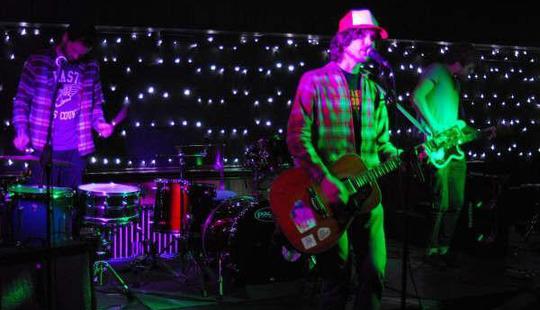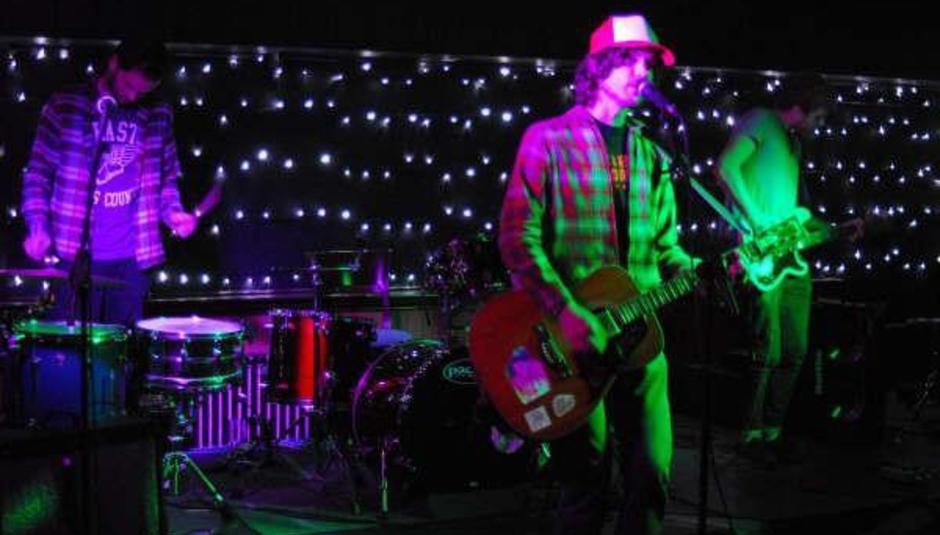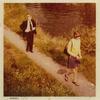Younghusband are what happens when one man’s obsession with music becomes too much to keep to himself. Euan Hinshelwood is 21, but he’s been playing in bands for seven years, most notably in an almost famous pub-rock band called the New Shapes. When their scuzzy, Buzzcocksy British punk failed to take off and the band broke up, Euan started nurturing his interest in writing and recording his own music. It started slow but recently, and with the influx of two permanent new band members, the songs have undergone rapid evolution from half formed ideas to a fully fledged grunge explosion. A lifelong obsession with bands like Pavement, the Lemonheads and Grandaddy combined with an ear for melody make Younghusband’s music the perfect antithesis to standard British indie, while his lo-fi, try-everything attitude to recording brings to mind Built to Spill or Guided by Voices.
Despite a large volume of recent recordings, Younghusband’s last release, the Judas Cow EP, was in June last year. It’s a great introduction to the band, and a good indication of what to expect next. During the course of this interview, it became clear that Euan is fighting to find a balance between working on his own in his bedroom, like he’s used to, and harnessing the energy of his live band and their new, bigger sound. This is why the next release didn’t follow quickly. Euan is the kind of guy who takes his time to get things right, and talking to him about what makes a good song was an illuminating experience. There are undoubtedly those among you who will take an interest in any band that references the great artists of American guitar indie, and Younghusband is bound to find its place along that timeline, albeit in their own, Watford-born way.
I forced Euan, Joe, and Adam away from the merch desk on our tour to talk about what it means to be a band from Watford, and how making music is hard. In particular the context of Watford was an interesting one. All three of them are totally unpretentious and without the sense of entitlement that dogs so many new bands from London (self included), and none of them seem adverse to slogging it for as long as they need to. It seems tenuous but to hear them talk about the difference between the capital and where they grew up, you can hear that they are more grateful for being able to play music than someone who had it at their doorstep all along, and this makes them even more agreeable than they already were. Furthermore, there’s a loyalty between the three that comes from being outsiders together. The whole interview was permeated with the affectionate banter of three people who have known each other for a long time, and some pretty shit puns from Euan.
I guess nobody’s perfect.

Emmy: You just came off stage on your first 20-date tour. How long have you been playing as a band?
Euan: Since June. I was in a band with Adam (drummer) when I was 17 so I asked him to play drums. I’ve known Joe (bassist) since I was a teenager. We’re friends of friends.
Joe: I was playing really bad songs as a singer-songwriter, and Euan just came up to me. We had jammed and stuff but we never thought about making music together before this.
Euan: There used to be these parties in Watford where we’d play stupid covers until really early in the morning, and me and Joe would end up playing together, doing some really standard blues licks.
Joe: I remember there was once a beer bottle involved. I might have done a little slide bass.
Is there quite a lot of music going on in Watford?
J: Loads.
E: When me and Joe were 14 or 15 there was a massive emo and hardcore scene in Watford, probably the biggest in the country. Bands like Cry for Silence, Gallows, they all came out of that. It was fucking huge.
Does Watford operate with its own musical identity, not just an offshoot of London?
E: It’s unique that it’s got a couple of popular music college (the Purcell school and West Harts Music College) and it’s closer enough to London for people from those colleges to go to gigs and then bring back what they’ve seen and form bands.
A: Thing about Watford is, there’s not a shortage of bands and musicians, but there’s a shortge of places to play. There’s no independent labels or anything like that, so anyone who’s half decent goes straight to London.
Is that something that you guys have done, or that you want to do?
E: Yeah we have done that, and it’s good thing. The two or three venues in Watford, if you can sing in tune and string a couple of chords together, you’ll get a fucking rapturous response, and you think you’re the best band in the world. That’s what I thought for the first few years I was playing in Watford. There was a venue when we were 14 that was like a mecca. It was the Horns and it’s owned by Norman Cook’s uncle, Dennis Cook. If you weren’t old enough to go down to London, you’d go there and you’d think the local bands where the bees knees.
Did watching Watford bands inspired you to be in one too?
All: Definitely.
J: when I was in a band with my flatmate Joey called the Stetsons, and we used to play in Watford, and we used to support Adam and Euan’s band the New Shapes. The New Shapes were kind of the big dog band –
E (laughing): Arguably the biggest band in Watford. Two singles of the week on Xfm? Oh yeah….
Your music now is, in terms of style, heavily influenced by American indie bands from the late '80s onwards, and in particular Grunge. when did you get into it in such a heavy way?
E: I grew up with two older brothers and my room was under theirs, so I was exposed to their music from a very young age. It was stuff like Nirvana, Pantera, not all really grunge, but '90s guitar music. You hear a sort of music and it just strikes a chord with you personally. You know it feels good so there’s no point arguing. I knew that kind of music from a young age, then when I got to 16, 17, I just thought fuck it, this is it.
And what did you start listening to when you got a bit further than Nirvana?
E: Elliott Smith, Pavement, Dinosaur Jr.
When I first met you a few years back, it was just after the New Shapes broke up, and you were trying out some acoustic stuff you’d stated writing. It didn’t really sound like someone who’s music was influenced by Pavement.
E: Not at all, cause I didn’t know how to write those sort of songs. Bob Dylan, the Beach Boys and the Beatles were what my parents listened to and you can’t escape what your parents listen to. if you listen to that in the car that’s going to stick in your mind. But now my music a backlash against that. I’m trying to do something that’s not blatant. The music that I like is heavy, melodic music, it’s not pompous or pretentious.
When when you write a song, are you thinking hard about how you want it to come out?
E: Not really, but sometimes. Trying to run away from what you naturally want to do is kind of how you develop. If you just write down the first thing that comes into your head, it’s too easy. Even if you think something’s really fucking good, if you’re going to play it to someone, and they’re going to say "I’ve heard that before", then what’s the point? It’s about challenging yourself.
When did you start really challenging yourself?
E: About two years ago. Back then I was just happy to finish a song. I was one of those people who would write a hundred choruses, or a hundred verses and never finish anything. It was only when I started to finish them I realised they sounded a little bit too much like something. But when you get the confidence to finish the songs, then you get the confidence to make them sound how you want. It’s only the last few months I’ve realised that music isn’t easy. You see people playing and you think it’s so effortless, but it’s effortless because they’ve worked at it, because they’ve pained over it. Of course every songwriter has the songs that just come out without thinking about it, but he vast majority get really pained over.
And why do you think you’re realising that now?
E: Just from touring, doing more gigs, being exposed to more music and stuff. When you get more serious about your songwriting, that’s when you realise it’s not easy. It’s not an easy thing to churn out a song. You know when Noel Gallagher whips out a song like 'Songbird' in three minutes, well you can fucking tell.
When I interviewed Eugene McGuinness, he said the throwaway songs are just as important as the ones you pore over, is that something that you agree with?
E: I think those songs are important as benchmarks.
J: You can tell the difference between something someone’s spent a lot of time on and something they haven’t. That’s not to say one’s better than the other, but you can just tell.
E: Personally I think those throwaway songs have a lesser shelf life, but that’s only to the person who writes them. To the people listening, it can have no shelf life whatsoever, if they like the song.
When I interviewed you a little over a year ago, you were just a bedroom artist, and the end goal was someone like Robert Wyatt. Now you’re a three-piece band, how is it changing?
E: Yes, we’re a band now, but I still want a split between that, and the bedroom stuff. I don’t want to go in just one direction. I love the energy of a live band, but I love laying things over each other in the studio, looking for sounds you wouldn’t find elsewhere. At the moment, we’re still finding our feet.
When you release something, it’s so final, you want to get the balance right. I think it’s great to see bands that present the songs differently live than it is on record. I don’t see any reason when we do an album why we couldn’t have lots of different kinds of songs, and that’s the good thing about having come from being a singer-songwriter.
I’ve heard someone say that, despite being very American stylistically, you’re also incredibly British in your way. What do you think of that?
J: That’s true. There’s a smallness to the music, it’s that bedroom thing again.
Going back to what you said, do you think coming from that background gives you a freedom on your record that you wouldn’t have if you’d always been a band? Being able to mix in solo songs with full band ones, and mix the arrangements up a little bit?
J: Yes, and I think we are working towards that.
But you’re not there yet?
E: There’s so many factors going into creating something like a record or a single that you’re lucky if you get something that is exactly what you wanted. You’re working your hardest to make something that you want but there are outside elements coming in all the time, and you’re changing your mind all the time. Like I said, music isn’t easy.
Your EP was out last summer, what are the plans for the next release?
E: The next release is pretty much ready bar a few tweaks. I need someone to take them off me so I stop fucking with them.
That’s the bedroom producer in you coming out.
E: I guess. I’ve also brought all my gear on tour, so I’m planning on recording a little EP over the next month. Anything that might suit being recorded in a van.
That’s the van producer in you coming out.
E: Hmm.






















